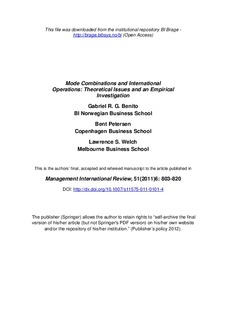| dc.contributor.author | Benito, Gabriel R. G. | |
| dc.contributor.author | Petersen, Bent | |
| dc.contributor.author | Welch, Lawrence S. | |
| dc.date.accessioned | 2012-05-23T11:05:17Z | |
| dc.date.available | 2012-05-23T11:05:17Z | |
| dc.date.issued | 2011 | |
| dc.identifier.issn | 1861-8901 | |
| dc.identifier.uri | http://hdl.handle.net/11250/93576 | |
| dc.description | The final publication is available at www.springerlink.com | no_NO |
| dc.description.abstract | An enduring characteristic of extant literature on foreign operation modes is its discrete choice approach, where companies are assumed to choose one among a small number of distinctive alternatives.
• In this paper, detailed information about the operations of six Norwegian companies in three key markets (China, UK and USA) is used as the basis for an exploration of the extent to which, and how and why, companies combine clearly different foreign operation modes. We examine their use of foreign operation mode combinations within given value activities as well as within given countries.
• The study reveals that companies tend to combine modes of operation; thereby producing unique foreign operation mode “packages” for given activities and/or countries, and that the packages are liable to be modified over time – providing a potentially important optional path for international expansion.
• The data show considerable variation across cases; ranging from extensive use of mode combinations to a singular focus on a specific mode of operation. The study contributes to a refinement of our understanding of the path of internationalisation, and throws up a number of awkward theoretical questions about the process. | no_NO |
| dc.language.iso | eng | no_NO |
| dc.publisher | Springer | no_NO |
| dc.subject | entry modes | no_NO |
| dc.subject | modes of operation | no_NO |
| dc.subject | mode combination | no_NO |
| dc.subject | case studies | no_NO |
| dc.title | Mode Combinations and International Operations: Theoretical Issues and an Empirical Investigation | no_NO |
| dc.type | Journal article | no_NO |
| dc.type | Peer reviewed | no_NO |
| dc.source.pagenumber | 803-820 | no_NO |
| dc.source.volume | 51 | no_NO |
| dc.source.journal | Management International Review | no_NO |
| dc.source.issue | 6 | no_NO |
| dc.identifier.doi | 10.1007/s11575-011-0101-4 | |
